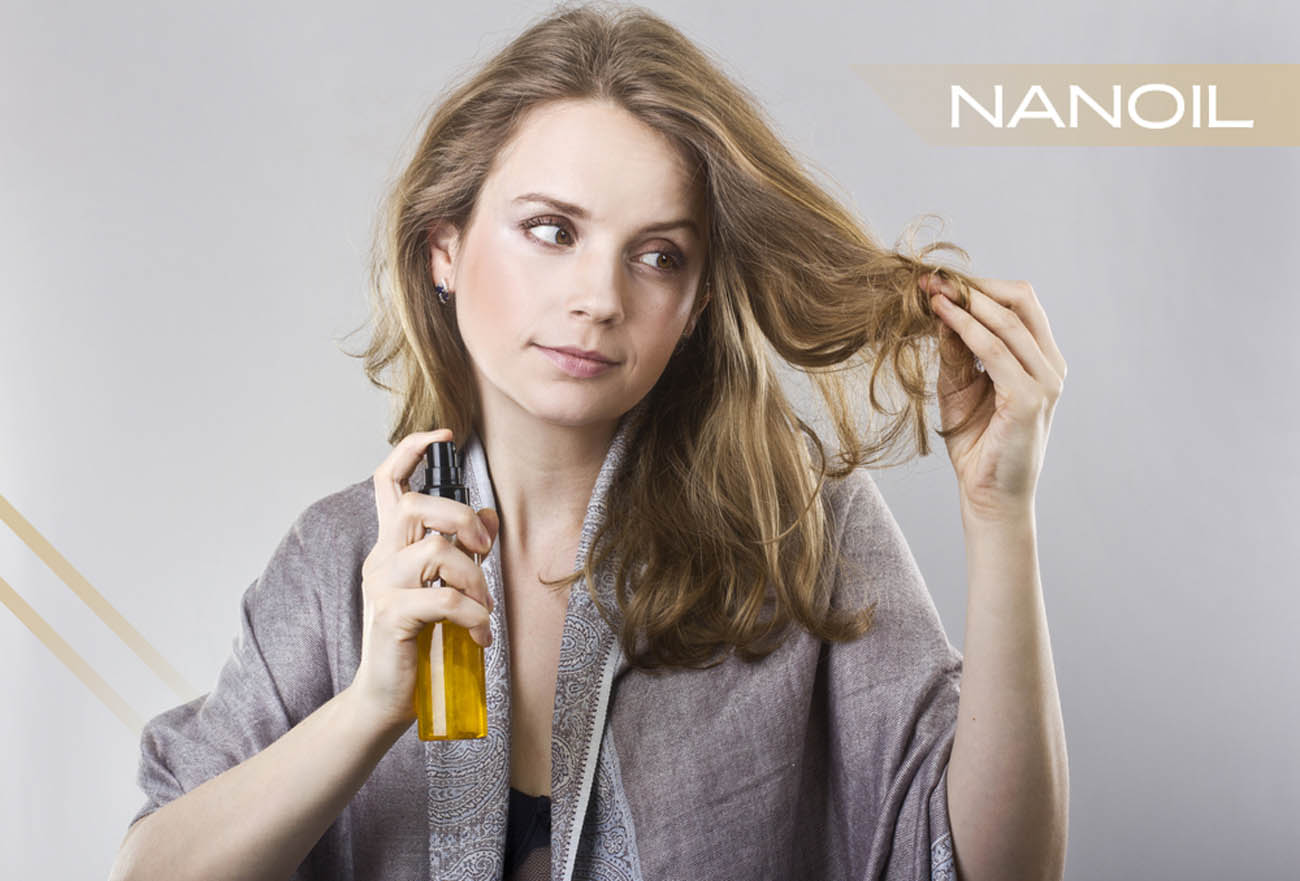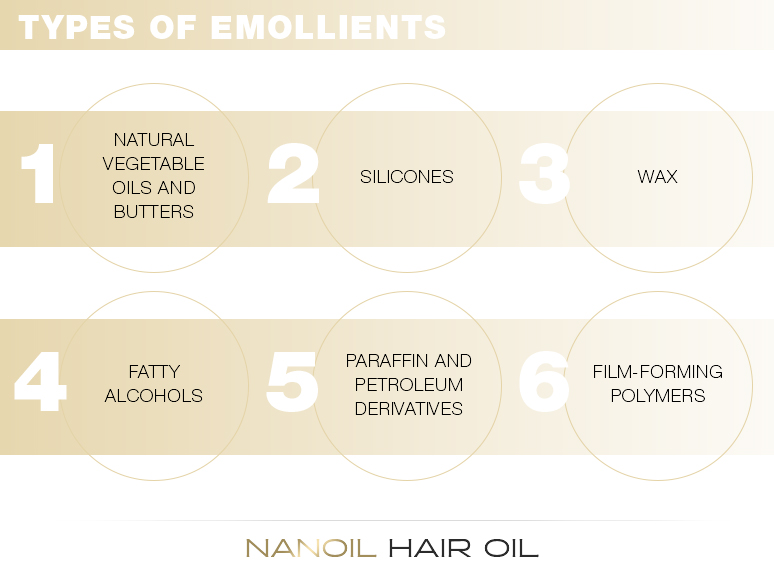- NANOIL Products
- Oils
- Face serums
- Hair masks
- Shampoos
- Hair conditioners
- Hair styling
- Care
- Hair Porosity Test
- Blog
- Contact

These are incredibly valuable substances that should be the base for the professional hair care. Every hair type needs emollients – no matter the structure, thickness, colour or level of damage. The protection against the blistering sun, UV radiation, hot airflow of blow-dryers, flat irons and toxins is the first thing we should focus on; without it, hair care is pointless. Using the right quantities of emollient is the key. Too much can weigh hair down and make it look unfresh. Too little leads to dehydration, static, lack of bounce, stiffness and increased frizz. We should remember that emollients have gentle moisturising properties so they quickly enhance the looks and shine of hair.

The largest and most popular group of emollients. You must match natural oils and butters to your hair structure and porosity. They give the best and most effective hair regenerating and nourishing substances. Apart from the intensified protection and a thin microscopic layer on hair surface, they deliver lots of minerals, vitamins, nutrients and valuable fatty acids to the inside of hair. That is why both oils and butters should be included in hair care for good. Hair oil treatment – done at least once a week – shields and beautifies hair, protecting the lipid coat as well as provides an in-depth nourishment.
The group of polymers that work on hair surface, creating a delicate protective film. They gift hair with a smooth layer that conditions and beautifies even the most damaged and over-processed hair. Silicones are emollients that can be found in hairstyling lotions, sprays and mousses, and heat protection products that should be applied before blow-dry or straightening routine. In hair care, you should go for silicones that are easily washed off. In this way, they won’t build up on hair surface and weigh strands down. It is worth mentioning that silicones are divided into as many as four groups: volatile silicones that evaporate from hair surface; light silicones washed away with water; silicones washed off with a mild shampoo; heavy silicones that are hard to remove without SLS shampoos (irritative, comedogenic). You’d better avoid heavy silicones in your hair care.
It belongs to the group of emollients that have a solid consistency. It is heavier than plant butters. Wax is not so easy to apply yet it is appreciated for its conditioning, protecting and softening properties for hair. Wax can be plant or animal derived. Bees wax is the most popular emollient in this category. It is added to hair balms and conditioners, and even to mascaras because it amazingly increases shine.
An equally popular lanolin is another animal-derived emollient. Lanolin protects sheep wool from wetting. It has gained popularity as its structure is similar to lipids found on the surface of human skin.
Jojoba is a very interesting wax, commonly known as an oil. It is a fluid plant-derived wax. Jojoba contains fatty acids, which makes it similar to oils. This emollient is extraordinary as it includes a unique ingredient – squalane – that has a similar structure to human sebum. That is why jojoba prevents both the excessive oiliness and dryness of hair and scalp.
All long-chain alcohols that neither harm hair nor dehydrate it. Instead, they condition, moisturise and bind water molecules, keeping water inside. Thanks to fatty alcohols, hair stays soft and elastic, becomes smooth, delicate and easy to comb out. They belong to the group of so-called good alcohols that can or even should be included in an everyday hair care. The most popular fatty acids: glycerol, cetyl alcohol, alcohol, cetearyl alcohol, lauryl alcohol, stearic acid, myristyl alcohol.
Paraffin is an emollient obtained through the distillation of petroleum. They are natural.
Paraffin – long-chain saturated hydrocarbons that make up a colorless and odourless liquid, a bit greasy. It is neutral so it does not cause irritations or allergic reactions. Paraffin is an excellent shine-boosting and moisturising hair product; it locks in water and protects from environmental pollution. It is common in hair care. Why? Paraffin creates an extremely strong and effective barrier. It is an amazing ingredient of products that protect hair ends from damage. As an emollient, paraffin is highly popular among women as it smoothes hair and adds shine after the very first use. It is an instant hair enhancer.
Liquid paraffin – known for ages as a fast-working substance for boosting hair body. Sadly, it can irritate the scalp so you can leave it in maximum 20 minutes. Because it slightly warms up the scalp and increases blood flow, the regular use can speed up hair growth. Liquid paraffin leaves a layer on hair surface – it keeps proper moisture and makes hair bouncy and less static.
The last group mentioned. Polymers do not contain conditioning ingredients. They are quite heavy and mostly chemically devised. These emollients are most common in styling products as they deliver a good ‘hold’ and increase shine. Cleansing shampoos are best for washing polymers off. If you use them too often, they can cause buildup on hair fibre. Luckily, the excess can be removed quickly while washing hair.
Comments: #0